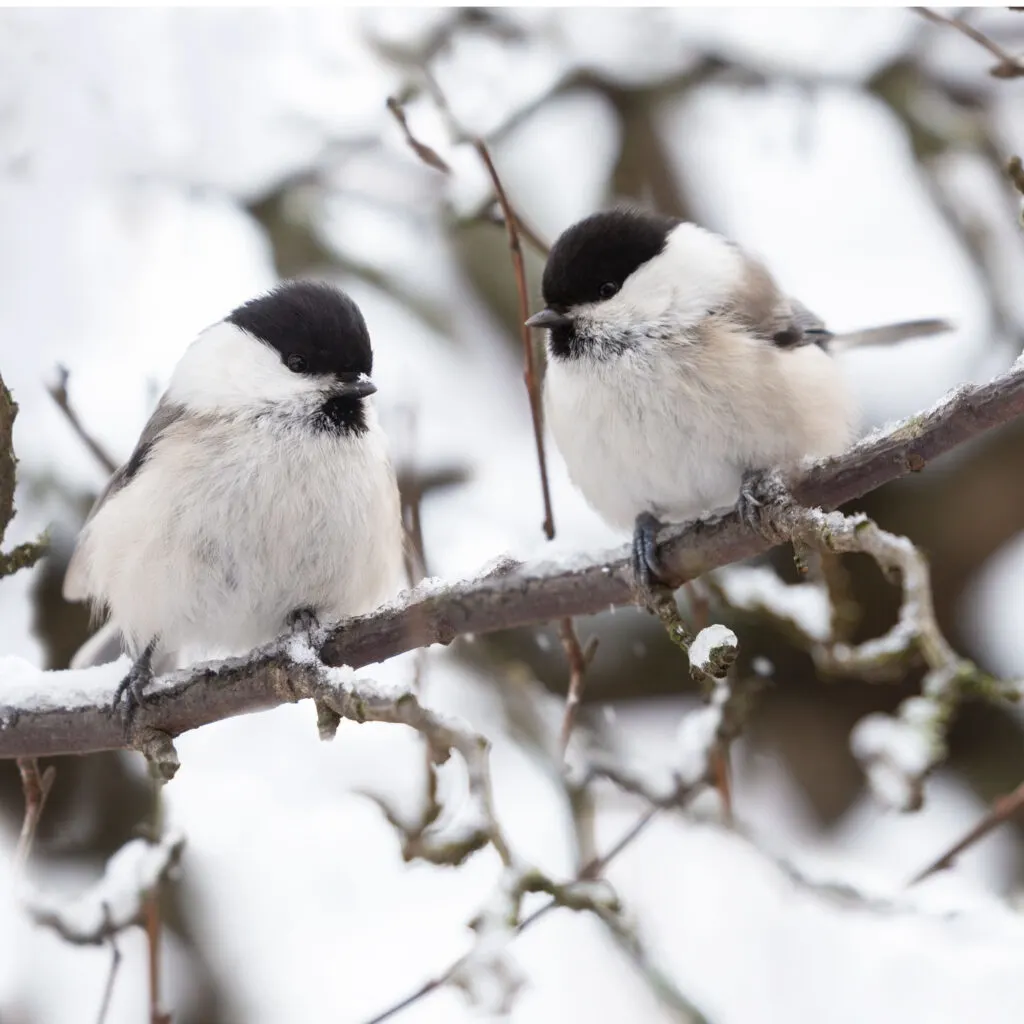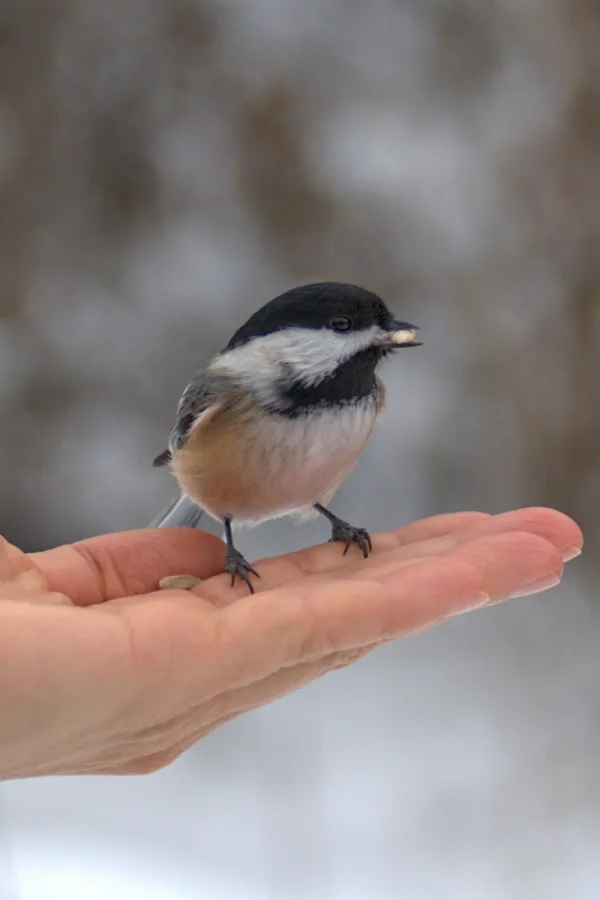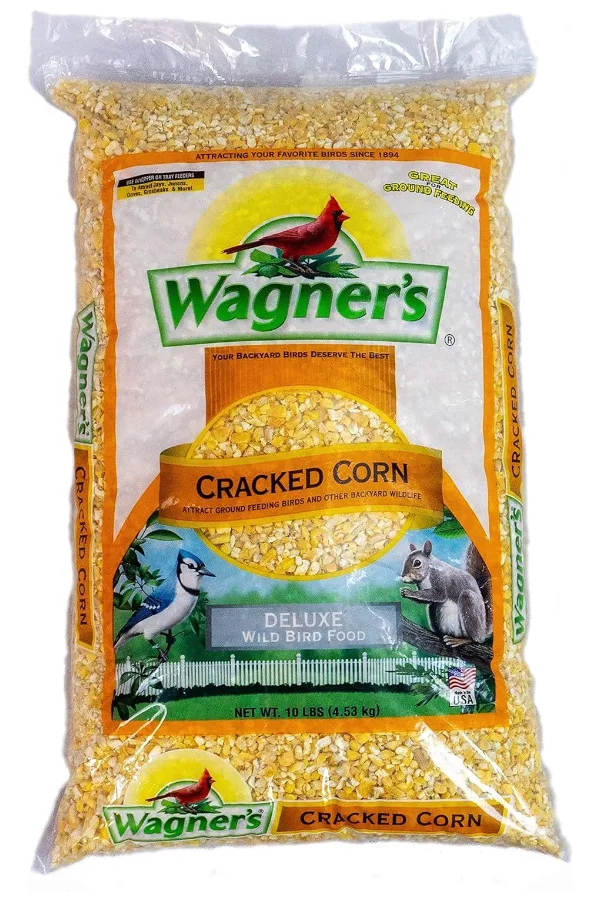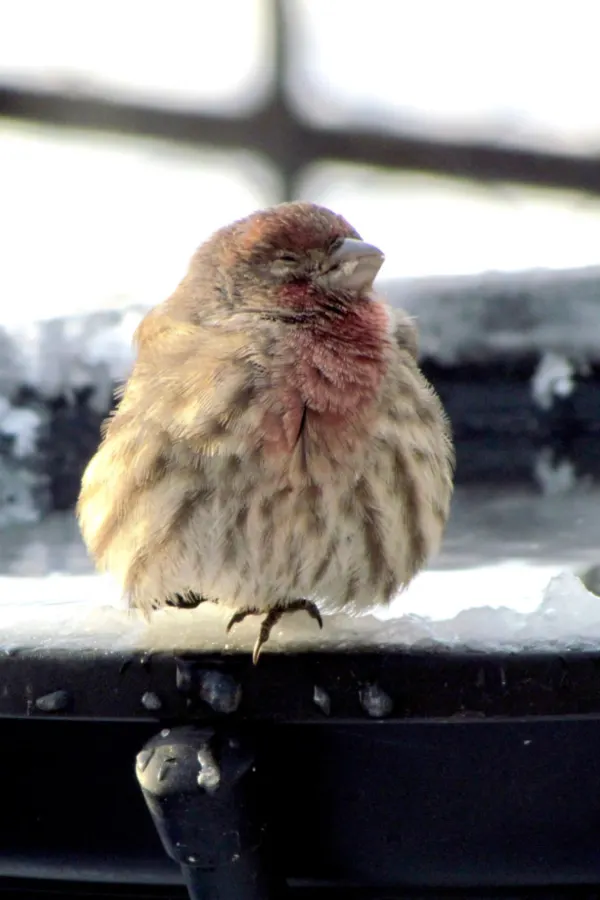If there is one bird that can always use a little help getting through the winter, it is the beloved chickadee – and one of the best way to do just that is feeding chickadees the food that can help them stay healthy, safe, warm and alive.
Chickadees are not only one of the smallest and cutest birds around, they are also one of the most beneficial birds to have visit your backyard. Especially when it comes to assisting gardeners. Chickadees are, to put it bluntly, insect eating machines. So much so that that they can consume two times their body weight in a single week!
That can be quite helpful for gardeners during the growing season. Especially when you consider plant attacking aphids, caterpillars, slugs and snails are some of their favorite snacks. Even better, they also feed on insect eggs and larva, which make them wonderful for helping to keep pest populations in check.

During the warmer months, insects are plentiful. But as the cold of late fall and early winter arrive, most insects either die off or hibernate in the ground. Even worse, many of the other sources of food chickadees consume such as seeds and nuts disappear or are in short supply as well. And for the chickadee, it can spell trouble!
Chickadees In The Winter – Feeding Chickadees In The Winter
Unfortunately, chickadees do not migrate to warmer locations when the cold, snow and ice arrive. And that can often have them scrambling for life sustaining food when the weather turns.
Chickadees are high energy birds. In the spring, summer and fall, they burn up a tremendous amount of energy flying about in search of insects, nuts and berries. Of course, with plenty of sources of food available, replenishing the energy is hardly an issue.
But even though you might think their energy and food needs would lessen in the winter months due to less activity, the opposite is true. Chickadees actually burn more energy on cold nights, using the calories to stay warm and keep from freezing.

When daybreak comes, they expend even more energy heading out to find calories and fat to replenish their bodies. And because food can be scarce in the winter, they often have to fly and work twice as hard to find it!
Feeding Chickadees In The Winter
There are three main ways you can help to make life easier on chickadees in the winter, and that is to help provide them with food, a source of water, and shelter.
When it comes to shelter, chickadees like to seek areas that provide them both warmth and safety. Hawks and owls are both predators of chickadees. And that is even more true in the winter when they too have a hard time finding enough food to survive.
Because of this, chickadees like to nest overnight in thick brush, thickets or cavities in trees. One great way to help them out is to simply leave ornamental grasses and other larger perennials up over the winter.
Chickadees also happen to be one of the few overwintering birds that will seek shelter in bird houses. It’s one reason many bird lovers will keep a few houses up over winter – just for their chickadees!

Now on to the subject of food and water. For this, the key is to give chickadees high fat, high calorie foods that are packed with nutrients. This can help recharge them quickly, which is important when the weather turns cold.
The Best Foods For Chickadees – Feeding Chickadees In The Winter
Here is a look at some of the best seeds and feed to put out for chickadees in the winter. For best results, use a combination of some or all of the sources below to provide a wide range of nutrients and energy.
Cracked Corn – Cracked corn is loaded with carbs and fiber and is a great addition to winter bird feeders for chickadees. Because it is already cracked, it is also easy for them to consume without issue. Best of all, cracked corn is one of the most inexpensive of all foods to feed birds. Affiliate Link: Cracked Corn Feed 10lbs.
Sunflower Seeds – The sharp beak of a chickadee can slice through the outer shell of a sunflower seed with ease. And not only are sunflower seeds easy for them to eat, they are also highly nutritious.

Sunflower seeds are high in fiber, fat and protein. They also contain iron and potassium and a long list of other important vitamins and nutrients. Both striped and black oil sunflower seeds are power packed, but of the two, black oil are the best of all when it comes to their oil and fat content. Affiliate Link : Black Oil Sunflower Seeds
Peanuts & Peanut Butter – Talk about nutritious, peanuts are full of calories, fat and oil. And chickadees absolutely love them! Shelled peanuts and peanut pieces are great for mixing in with seeds for feeders. Even better, hang a few pine cones outside and load them up with peanut butter – and the chickadees will come calling quickly.
Beyond Seeds & Nuts – Feeding Chickadees In The Winter
Suet Blocks – The best way to provide chickadees with a supplemental high fat and calorie food source is with suet. Suet is rendered fat that can also contain peanuts, seeds, berries and nuts. And chickadees flock to them!
You can purchase suet blocks ready to go – or make them quite easily at home using lard, fat or peanut butter. They are actually incredibly helpful to nearly all overwintering birds. In addition to chickadees, cardinals, finches, blue jays and wrens will snack from them as well. For more on making your own at home, see our article: How To Make Homemade Suet Blocks

Dried Fruit & Berries – Dried fruits and berries are also excellent supplements for chickadees feeding in the winter. They also provide fiber, vitamins and calories. These can certainly be more expensive, but supplementing them into their feed every so often gives chickadees a high energy treat.
Winter Water For Chickadees – Feeding Chickadees In The Winter
Last but not least, chickadees need water to survive as well. Water is important to keep the birds hydrated and help with metabolism. Chickadees will “drink” from snow and ice, chipping off and taking in both to hydrate their bodies.
Because of this, simply having a few bowls of water (even if they freeze) under or near your feeders can go a long way to help them. As important as food is – don’t forget the water!
Here is to helping the chickadees in your backyard make it through this winter. And even better, having them healthy and thriving next spring to help keep all of those insects under control!
Simple Garden Life
Follow Our Facebook Page For Even More Great Tips! Simple Garden Life Facebook Page
Simple Garden Life is a website dedicated to keeping gardening fun, simple and enjoyable! We publish two new articles each week along with a new garden podcast episode every two weeks. This article may contain affiliate links.
